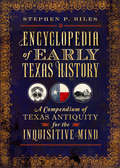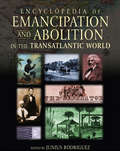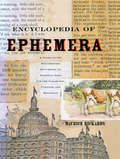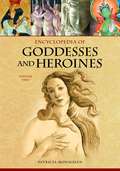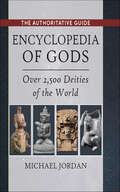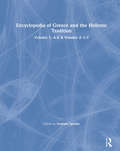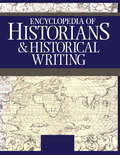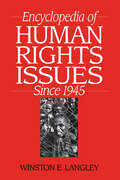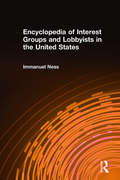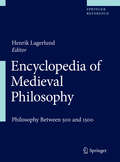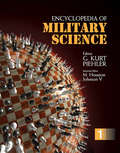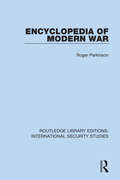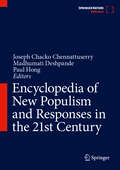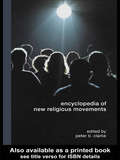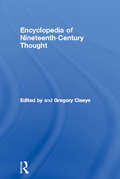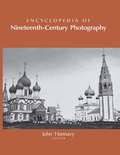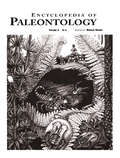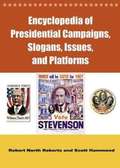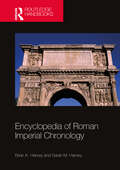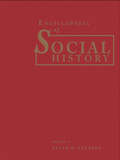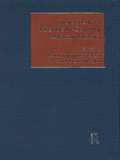- Table View
- List View
Encyclopedia of Early Texas History: A Compendium of Texas Antiquity for the Inquisitive Mind
by Stephen P. BilesIn this age of hustle and bustle, Texans cannot afford to flounder about unawares of where to turn for information most urgent and necessary as their own history. What you want--nay, what you need--is the encyclopedia herein. The patriot will find stories of heroism and warning, the student will discover annals of valuable learning and the curious will discover purpose renewed in historical origin. With educational and entertaining illustrations, the reader will at once be transported back to historic times and doubtless become the "go-to" guy or gal for Texas trivia. From the arrival of Aguayo to the zeal of Zavala, each page contains a morsel of valuable history of the great state of Texas. Texan and scholar Stephen Biles has collected an invaluable source of information so exciting and excellent that it has been sized to fit within your pocket or purse--after all, one never knows when history might call.
Encyclopedia of Emancipation and Abolition in the Transatlantic World
by Junius P. RodriguezThe struggle to abolish slavery is one of the grandest quests - and central themes - of modern history. These movements for freedom have taken many forms, from individual escapes, violent rebellions, and official proclamations to mass organizations, decisive social actions, and major wars. Every emancipation movement - whether in Europe, Africa, or the Americas - has profoundly transformed the country and society in which it existed. This unique A-Z encyclopedia examines every effort to end slavery in the United States and the transatlantic world. It focuses on massive, broad-based movements, as well as specific incidents, events, and developments, and pulls together in one place information previously available only in a wide variety of sources. While it centers on the United States, the set also includes authoritative accounts of emancipation and abolition in Europe, Africa, the Caribbean, and Latin America. "The Encyclopedia of Emancipation and Abolition" provides definitive coverage of one of the most significant experiences in human history. It features primary source documents, maps, illustrations, cross-references, a comprehensive chronology and bibliography, and specialized indexes in each volume, and covers a wide range of individuals and the major themes and ideas that motivated them to confront and abolish slavery.
Encyclopedia of Ephemera: A Guide to the Fragmentary Documents of Everyday Life for the Collector, Curator and Historian
by Maurice Rickards Michael Twyman Sally De Beaumont Amoret TannerThe joy of finding an old box in the attic filled with postcards, invitations, theater programs, laundry lists, and pay stubs is discovering the stories hidden within them. The paper trails of our lives -- or ephemera -- may hold sentimental value, reminding us of great grandparents. They chronicle social history. They can be valuable as collectibles or antiques. But the greatest pleasure is that these ordinary documents can reconstruct with uncanny immediacy the drama of day-to-day life.The Encyclopedia of Ephemera is the first work of its kind, providing an unparalleled sourcebook with over 400 entries that cover all aspects of everyday documents and artifacts, from bookmarks to birth certificates to lighthouse dues papers. Continuing a tradition that started in the Victorian era, when disposable paper items such as trade cards, die-cuts and greeting cards were accumulated to paste into scrap books, expert Maurice Rickards has compiled an enormous range of paper collectibles from the obscure to the commonplace. His artifacts come from around the world and include such throw-away items as cigarette packs and crate labels as well as the ubiquitous faxes, parking tickets, and phone cards of daily life.As this major new reference shows, simple slips of paper can speak volumes about status, taste, customs, and taboos, revealing the very roots of popular culture.
Encyclopedia of Goddesses and Heroines, Volume 1: Africa, Eastern Mediterranean, Asia
by Patricia MonaghanThis two-volume set provides a comprehensive guide to the vast array of feminine divine figures found throughout the world.
Encyclopedia of Goddesses and Heroines, Volume 2: Europe and the Americas
by Patricia MonaghanDrawn from a variety of sources ranging from classical literature to early ethnographies to contemporary interpretations, the Encyclopedia of Goddesses and Heroines provides a comprehensive introduction to the ways goddess figures have been viewed through the ages. This unique encyclopedia of over thousands of figures of feminine divinity describes the myths and attributes of goddesses and female spiritual powers from around the world.
Encyclopedia of Gods: Over 2,500 Deities of the World
by Michael JordanFind Everything You Want to Know About Gods and Goddesses of the World All civilizations throughout history have sought to answer the great mysteries of life on earth through worship of gods, deities, or creators. Encyclopedia of Gods offers a comprehensive survey of 2,500 major and minor gods, goddesses, and deities from religions, cultures, folklores, and mythologies across the globe. Entries are listed alphabetically, beginning with A-a, the Mesopotamian sun goddess, and ending with Zurvan, the Persian god of fate; in between is everything known about Osiris, Ra, Isis, Horus, Manu, and thousands more. Each entry covers specific pantheons, dates of worship, the role the god played, and defining characteristics, symbols, and attributes. The listings range from short descriptions of lesser-known deities to full narrative essays covering major gods and goddesses, and include appearances in literature and art. Covering a tremendous breadth of human history from 60,000 years ago to the present and fully indexed and cross-referenced by civilization and subject, this invaluable reference manual is an essential resource for any student, researcher, or teacher of theological, historical, or anthropological studies, and a fascinating read for anyone interested in learning about deities worshipped throughout history. Whether used to look up details about specific gods or civilizations or just read from cover to cover, Encyclopedia of Gods is an extremely thorough and endlessly absorbing source of information.
Encyclopedia of Greece and the Hellenic Tradition
by Graham SpeakeHellenism is the living culture of the Greek-speaking peoples and has a continuing history of more than 3,500 years. The Encyclopedia of Greece and the Hellenic Tradition contains approximately 900 entries devoted to people, places, periods, events, and themes, examining every aspect of that culture from the Bronze Age to the present day. The focus throughout is on the Greeks themselves, and the continuities within their own cultural tradition. Language and religion are perhaps the most obvious vehicles of continuity; but there have been many others--law, taxation, gardens, music, magic, education, shipping, and countless other elements have all played their part in maintaining this unique culture. Today, Greek arts have blossomed again; Greece has taken its place in the European Union; Greeks control a substantial proportion of the world's merchant marine; and Greek communities in the United States, Australia, and South Africa have carried the Hellenic tradition throughout the world. This is the first reference work to embrace all aspects of that tradition in every period of its existence.
Encyclopedia of Historians and Historical Writing
by Kelly BoydThe Encyclopedia of Historians and Historical Writing contains over 800 entries ranging from Lord Acton and Anna Comnena to Howard Zinn and from Herodotus to Simon Schama.Over 300 contributors from around the world have composed critical assessments of historians from the beginning of historical writing to the present day, including individuals from related disciplines like Jürgen Habermas and Clifford Geertz, whose theoretical contributions have informed historical debate.Additionally, the Encyclopedia includes some 200 essays treating the development of national, regional and topical historiographies, from the Ancient Near East to the history of sexuality.In addition to the Western tradition, it includes substantial assessments of African, Asian, and Latin American historians and debates on gender and subaltern studies.
Encyclopedia of Human Rights Issues Since 1945
by Winston E. LangleyThis comprehensive and up-to-date encyclopedia on human rights issues from 1945 to the present includes more than 400 entries on incidents and violations, instruments and initiatives, countries, and human rights activities. Its scope is global, and its purpose is both to sum up the accomplishments in human rights in our time and also to point out and describe the violations that continue to be perpetrated around the world. Entries cover major issues; incidents and violations; concepts and terms; activists; organizations; and human rights instruments. Entries cover more than 50 countries, from Afghanistan to Yugoslavia. Entries conclude with suggestions for further readings; and a timeline of significant dates since 1945 and the text of the Universal Declaration of Human Rights are also included.
Encyclopedia of Interest Groups and Lobbyists in the United States
by Immanuel NessA comprehensive general reference on major American interest groups. This encyclopedia provides information on the lobbies and interest groups that dominate modern American politics. It provides descriptions of 13 categories of groups, followed by A-Z entries on the groups within that category.
Encyclopedia of Medical Immunology
by Anne Davidson Ian R. Mackay Noel R. Rose Betty DiamondDifferent from other resources, this volume offers a broad appeal to microbiologists, immunologists, and infectious disease specialists on Autoimmune Diseases. The volume covers topics such as skin and alopecia, Kidney, Liver, Paraneoplastic, Resolution of inflammation, Cardiovascular/systemic inflammation and atherosclerosis, Gut, Regulatory lymphocytes T, B, other and Rheumatic Disease. The volume is written by internationally renowned authors who are authorities in their respective fields.
Encyclopedia of Medieval Philosophy
by Henrik LagerlundResearch on medieval philosophy has advanced greatly in the last thirty years, but there has not been a comprehensive encyclopedia summarizing the current research available. This two-volume reference work fills that void. The Encyclopedia of Medieval Philosophy covers all areas of philosophy in the Middle Ages and part of the Renaissance, ranging from 500 to 1500 CE. It contains general entries on medieval philosophers and medieval philosophies and on the key terms and concepts in the subject area, but it also provides more in-depth details and analyses of particular theories. Furthermore, in order to gain an insight into the social and cultural context of the material, entries are included on the teaching of philosophy, the career of philosophers, and the place of philosophy within the universities. Complete with cross-references between key words and related essays to enable efficient searches, this Encyclopedia is exhaustive, unprecedented, and user-friendly. It is indispensable for scholars of medieval philosophy and of the history of ideas, and it is also useful for anyone interested in medieval ideas and thought.
Encyclopedia of Military Science
by G. Kurt PiehlerThe Encyclopedia of Military Science provides a comprehensive, ready-reference on the organization, traditions, training, purpose, and functions of today’s military. Entries in this four-volume work include coverage of the duties, responsibilities, and authority of military personnel and an understanding of strategies and tactics of the modern military and how they interface with political, social, legal, economic, and technological factors. A large component is devoted to issues of leadership, group dynamics, motivation, problem-solving, and decision making in the military context. Finally, this work also covers recent American military history since the end of the Cold War with a special emphasis on peacekeeping and peacemaking operations, the First Persian Gulf War, the events surrounding 9/11, and the wars in Afghanistan and Iraq and how the military has been changing in relation to these events. Click here to read an article on The Daily Beast by Encyclopedia editor G. Kurt Piehler, "Why Don't We Build Statues For Our War Heroes Anymore?"
Encyclopedia of Military Science
by G. Kurt PiehlerThe Encyclopedia of Military Science provides a comprehensive, ready-reference on the organization, traditions, training, purpose, and functions of today’s military. Entries in this four-volume work include coverage of the duties, responsibilities, and authority of military personnel and an understanding of strategies and tactics of the modern military and how they interface with political, social, legal, economic, and technological factors. A large component is devoted to issues of leadership, group dynamics, motivation, problem-solving, and decision making in the military context. Finally, this work also covers recent American military history since the end of the Cold War with a special emphasis on peacekeeping and peacemaking operations, the First Persian Gulf War, the events surrounding 9/11, and the wars in Afghanistan and Iraq and how the military has been changing in relation to these events. Click here to read an article on The Daily Beast by Encyclopedia editor G. Kurt Piehler, "Why Don't We Build Statues For Our War Heroes Anymore?"
Encyclopedia of Modern War (Routledge Library Editions: International Security Studies #5)
by Roger ParkinsonThis book, first published in 1977, presents a comprehensive survey of the upheavals experienced in warfare from 1793 to the end of the twentieth century, a period that saw many fundamental changes – from the Napoleonic wars to the advent of total war, guerrilla and nuclear warfare. It discusses in detail the main aspects of warfare – battles, weapons, and people. It concentrates equally on all three, not emphasising one aspect at the expense of the others, and allowing cross-references between them so as to fit them into the general pattern of development. Also included are other factors essential to an understanding of modern warfare, such as technological items, and conceptual entries such as basic strategy and tactics, and various military theories and principles.
Encyclopedia of New Populism and Responses in the 21st Century
by Paul Hong Joseph Chacko Chennattuserry Madhumati DeshpandeThis book mainly seeks to explain, define and update the recurring forms of populism in the 21st century. Examples used in this Introduction are limited to English speaking countries. But populism's existent expressions are ecumenically global. Like any long-lasting perennial organism it is sturdy and comes in a variety of forms adaptable to environmental changes. In political or cultural terms its expression has been neither exclusively left, center, nor right. Populism contains multitudes, dates back centuries before it was identified with its modern name. Populism has become a hot button issue in the recent times. The UK's Sunday heavy The Guardian published about 300 articles in 1998 that used the term "populism" or "populist" and by 2016 its use had skyrocketed to over 2,000. And growing. Probably the single greatest catalyst to date that injected populism into the world's Internet common discourse, that infused it into journalism right, left and centerand awakened populist political activism was the Great Recession of 2007-08 and the subsequent global deprivations it engendered. In today's world populism promises to remain and renew its intensity due to the covid-19 pandemic's deleterious effects on most nations middle and low-income groups, specially minorities. These are some reasons among many why it is time for populism to be relocated, identified and given refreshed 21st understandings. It has a shifting nature among people, events, causes that constantly demands fresh studies. It is a social and cultural phenomenon both universal and particular. In our 21st century world it is a product of our shared cultures and each our own exceptional deep culture. This Encyclopedia is unique in its composition as it includes all the major disciplines of Social Sciences and thus will be a one stop source of nine different disciplines looking at new populism.
Encyclopedia of New Religious Movements
by Peter B. ClarkeNew Religious Movements (NRMs) can involve vast numbers of followers and in many cases are radically changing the way people understand and practice religion and spirituality. Moreover, many are having a profound impact on the form and content of mainstream religion. The Encyclopedia of New Religious Movements provides uniquely global coverage of the phenomenon, with entries on over three-hundred movement from almost every country in the world. Coverage includes movements that derive from the major religions of the world and to neo-traditional movements, movements often overlooked in the study of NRMs. In addition to the coverage of particular movements there are also entries on topics, themes, key thinkers and key ideas, for example the New Age Movement, Neo-Paganism, New Religion and gender, NRMs and cyberspace, NRMs and the law, the Anti-Cult Movement, Swedenborg, Jung, Teilhard de Chardin, Lovelock, Gurdjieff, al-Banna, Qutb. The marked global approach and comprehensiveness of the encyclopedia enable an appreciation of the innovative energy of NRMs, of their extraordinary diversity, and the often surprising ways in which they can propagate geographically. The most ambitions publication of its sort, the Encyclopedia of New Religious Movements is a major addition to the reference literature for students and researchers of the field in religious studies and the social sciences. Entries are cross-referenced with short bibliographies for further reading. There is a full index.
Encyclopedia of Nineteenth Century Thought
by Gregory ClaeysEncyclopedia of Nineteenth Century Thought provides essential information on, and a critical interpretation of, nineteenth-century thought and nineteenth-century thinkers. The project takes as its temporal boundary the period 1789 to 1914. Encyclopedia of Nineteenth Century Thought primarily covers social and political thinking, but key entries also survey science, religion, law, art, concepts of modernity, the body and health, and so on, and thereby take into account all of the key developments in the intellectual history of the period. The encyclopedia is alphabetically organized, and consists of:* principal entries, divided into ideas (4000 words) and persons (2500 words)* subsidiary entries of 1000 words, which are entirely biographical* informational entries of 500 words, which are also biographical.
Encyclopedia of Nineteenth-Century Photography
by John HannavyThe Encyclopedia of Nineteenth-Century Photography is the first comprehensive encyclopedia of world photography up to the beginning of the twentieth century. It sets out to be the standard, definitive reference work on the subject for years to come. Its coverage is global – an important ‘first’ in that authorities from all over the world have contributed their expertise and scholarship towards making this a truly comprehensive publication. The Encyclopedia presents new and ground-breaking research alongside accounts of the major established figures in the nineteenth century arena. Coverage includes all the key people, processes, equipment, movements, styles, debates and groupings which helped photography develop from being ‘a solution in search of a problem’ when first invented, to the essential communication tool, creative medium, and recorder of everyday life which it had become by the dawn of the twentieth century. The sheer breadth of coverage in the 1200 essays makes the Encyclopedia of Nineteenth-Century Photography an essential reference source for academics, students, researchers and libraries worldwide.
Encyclopedia of North American Railroads
by William D. Middleton Rick Morgan Roberta L. DiehlLavishly illustrated and a joy to read, this authoritative reference work on the North American continent's railroads covers the U.S., Canadian, Mexican, Central American, and Cuban systems. The encyclopedia's over-arching theme is the evolution of the railroad industry and the historical impact of its progress on the North American continent. This thoroughly researched work examines the various aspects of the industry's development: technology, operations, cultural impact, the evolution of public policy regarding the industry, and the structural functioning of modern railroads. More than 500 alphabetical entries cover a myriad of subjects, including numerous entries profiling the principal companies, suppliers, manufacturers, and individuals influencing the history of the rails. Extensive appendices provide data regarding weight, fuel, statistical trends, and more, as well as a list of 130 vital railroad books. Railfans will treasure this indispensable work.
Encyclopedia of Paleontology
by Ronald SingerFirst Published in 2000. Routledge is an imprint of Taylor & Francis, an informa company.
Encyclopedia of Presidential Campaigns, Slogans, Issues, and Platforms
by Robert North Roberts Scott J. HammondAimed at college undergraduates and high school students, this reference covers the political history of presidential rhetoric and campaigns. The first part of the volume contains chronologically arranged entries describing the course and nature of each presidential campaign since 1789. The second part features longer, general entries discussing broader campaign issues (affirmative action, for example) as well as short entries that focus on a single slogan or phrase (such as "read my lips"). Annotation ©2004 Book News, Inc., Portland, OR (booknews.com)
Encyclopedia of Roman Imperial Chronology
by Brian K. Harvey Sarah M. HarveyThis reference work provides detailed lists of the names and titles of Roman emperors from Augustus to Severus Alexander, as well as a chronology of significant historical events and a brief overview of imperial portraiture for each of these emperors.The names, titles, and portraits of the emperor appeared in a wide variety of public contexts, making them some of the most important means of contact between the emperor and his subjects as well as vehicles for the spread of imperial ideology. Being able to precisely date changes in titulature and portraiture is useful not only for the study of imperial ideology but also in providing a chronological context for the inscriptions and statues that bore the emperor’s name or face. Along with comprehensive chronological data and tables detailing specific changes in nomenclature and titulature, this volume also discusses selected inscriptions, coins and papyri as examples. The lists also include important historical events during an emperor’s reign to give further context and a better understanding of changes in names and titles and a brief overview of the development of imperial portraiture for each emperor.Encyclopedia of Roman Imperial Chronology is an essential reference work for any scholar working on the Roman Empire, in particular epigraphers, numismatists, papyrologists, and archaeologists.
Encyclopedia of Social History (Garland Reference Library Of Social Science Ser. #Vol. 780)
by Peter N. StearnsA reference surveying the major concerns, findings, and terms of social history. The coverage includes major categories within social history (family, demographic transition, multiculturalism, industrialization, nationalism); major aspects of life for which social history has provided a crucial per
Encyclopedia of Twentieth-Century African History
by Paul Tiyambe Zeleza Dickson EyohWith nearly two hundred and fifty individually signed entries, the Encyclopedia of Twentieth-Century African History explores the ways in which the peoples of Africa and their politics, states, societies, economies, environments, cultures and arts were transformed during the course of that Janus-faced century. Overseen by a diverse and distinguished international team of consultant editors, the Encyclopedia provides a thorough examination of the global and local forces that shaped the changes that the continent underwent. Combining essential factual description with evaluation and analysis, the entries tease out patterns from across the continent as a whole, as well as within particular regions and countries: it is the first work of its kind to present such a comprehensive overview of twentieth-century African history. With full indexes and a thematic entry list, together with ample cross-referencing and suggestions for further reading, the Encyclopedia will be welcomed as an essential work of reference by both scholar and student of twentieth-century African history.Choice Outstanding Academic Title 2004
